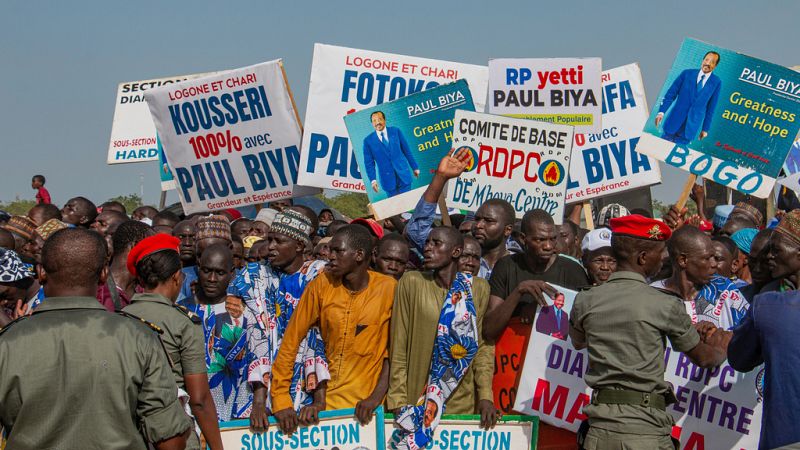Cameroon’s youth lose faith ahead of Presidential election

Elvis Nghobo tried to enroll in four different vocational schools in Cameroon — without success. Frustrated, the 34-year-old turned to selling food in a market in Yaoundé, the country’s seat of power.
Nghobo blames his struggles on what he calls a corrupt education system that favors the children of the elite. As the Central African nation prepares for Sunday’s presidential election, he says he will not be voting.
He believes the results are already decided in favor of Paul Biya, the 92-year-old president — the world’s oldest sitting leader — who has been in power his entire life. “He’s already too old to govern, and it’s exhausting to know only him as president,” Nghobo told the Associated Press.
That feeling is shared by millions of young Cameroonians, whose median age is just 18 — a striking reflection of the tension between Africa’s youthful population and its aging leaders.
Crisis After Crisis
Biya is seeking an eighth term in a single-round election in which 8.2 million Cameroonians are registered to vote.
He became president in 1982 after the resignation of his predecessor Ahmadou Ahidjo and has ruled ever since, winning seven consecutive elections. Cameroon has had only two heads of state since its independence in 1960.
“Faced with an increasingly difficult international environment, the challenges before us are growing more urgent,” Biya said while announcing his latest candidacy. “In such a situation, I cannot abandon my mission,” he added, without elaborating.
Young people in the country are demanding jobs. According to the World Bank, the unemployment rate stands at 3.5%, but about 57% of working-age people between 18 and 35 earn a living in the informal sector.
Although Cameroon is an oil-producing country with modest economic growth, young people say the benefits go mainly to the elite.
The country is also facing several security crises. In the west, a long-running separatist conflict is being waged mainly by English speakers who say they are marginalized by the French-speaking majority. In the north, Boko Haram militants from neighboring Nigeria continue to carry out sporadic attacks in border towns.
The Opposition
In this election, Biya faces nine opposition candidates — some of them former allies and ministers. Among them are Issa Tchiroma Bakary, recently Minister of Employment, and Bello Bouba Maigari, a former Minister of Tourism.
Another prominent opposition figure, Maurice Kamto, who came second in 2018 with 14% of the vote, has been barred from running. The electoral commission said Kamto was disqualified because his party was also backing another candidate — a justification his lawyers have rejected. Kamto was arrested after the last election for demanding greater transparency.
“The main opposition candidates are all former ministers under Paul Biya who resigned just weeks before the presidential race. Young people see this as hypocrisy — proof that the country is still driven by the ‘politics of the belly,’” said Wilson Tamfuh, a law professor at the University of Dschang, speaking to the AP.
He referred to a tactic of presenting “fake opponents” to weaken real opposition support in exchange for favors from the president.
“President Until Death”
Analysts say Cameroon’s political elite are reluctant to disrupt the order established during Biya’s decades-long rule.
“There’s no doubt Biya is deeply unpopular in the country, but he enjoys the backing of many elites and traditional leaders thanks to corruption and a network of financial interests. That plays a major role in his continued victories,” said Nat Powell, Africa analyst at Oxford Analytica.
The government has always denied such accusations.
The ruling Cameroon People’s Democratic Movement (CPDM) dominates parliament, holding 94 of 100 Senate seats and 152 of 180 seats in the National Assembly.
Speculation about Biya’s health is frequent, as he spends much of his time in Europe, leaving day-to-day governance to party officials and family members.
“In part, he wants to remain president until his death, but it’s also tied to his inner circle and the ruling party,” Powell added. “They see him as a stabilizing figure — as long as he’s alive, everything stays in place.”
Patriotism
At the University of Yaoundé I, 27-year-old geoscience student Manoung Wilfried sat near a staircase, deep in thought. He said he would vote even though no candidate had convinced him — and criticized Biya’s decision to run again.
Wilfried said only patriotism motivates him to cast a ballot. “For the good of the country, he should hand over power to someone else who can better understand and solve young people’s problems,” he said of Biya.
Like many others, Nghobo has lost faith in an electoral system he believes is designed to keep Biya in power. “Change in this country can only come through other means — not through the ballot box,” he said.
Today

